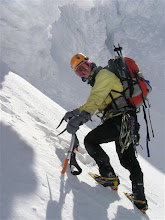One of the interesting things about going to high altitudes is the effect on the boiling point of water. While on Aconcagua, at our highest camp, which was at 19,520ft/5950m, I had boiled some water for dinner. I was about to pour it into one of the liter Nalgene bottles that we used for storing and drinking water. Just as I started to pour the water, it became clear that I was going to spill it over my left hand that was holding the bottle, and Aaron sarted saying "WATCH OUT!". Too late! I poured it over my hand, anyway. And kept pouring. I barely noticed! Down at sea level, I would have burned myself for sure! Aaron was surprised. We were in a low pressure weather system, in addition to being at the high altitude, and together, I suspect that the water was boiling at somewhere around 180F/82C, which I would have thought would have been enough to burn, since the "Instahot" faucets, at 190F seem enough to scald. It may also be that since the weather was so chilly (at most, 30F/-1C), that it also helped cool the water as I poured it, bringing the water temperature down even further before it splashed over my hand.
The other aspect of the lowered boiling temperature (and cold weather), was that we couldn't get our freeze-dried food to rehydrate very well. I would have ramen noodles mixed with bulgar wheat, coucous, or pressed rice (all of which do hydrate well, even in cold water!) plus some freeze-dried corn and peas. I'd pour the boiling water into my container that had all of the food in it, cover it (I used a Glad "disposable" food storage container), and let it sit for many, many minutes. The noodles and grain would hydrate and soften, but the peas and corn would always seem crunchy, no matter how long I had them soak. . . Similarly, Wim and Aaron noticed that the higher we got, their pre-packaged freeze-dried meals would become less and less "cooked". . .
This all makes me want to experiment with a microwave - would it work as well at altitude as it does at sea level? Would we be able to superheat water up high, as we can at sea level? Would super-heated water make it so that we could rehydrate all of those freeze-dried foods?
Given the hardware that we were already seeing at basecamp: internet, satellite phones, I suspect that microwaves will start appearing soon, and then all these pressing questions could be answered!
Subscribe to:
Post Comments (Atom)

No comments:
Post a Comment